The Teacher
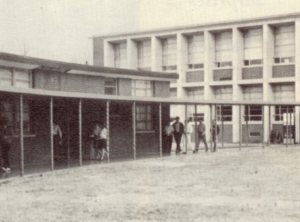 I got sick my first year teaching high school. I was tired and weak. Acid turned my stomach inside out. I heaved up yellow stuff. I tried to wait it out, hoping I’d get well, but my condition only grew worse so I finally went to a doctor and summarized my symptoms. “I’m really sick,” I told him. “I must have cancer or something.”
I got sick my first year teaching high school. I was tired and weak. Acid turned my stomach inside out. I heaved up yellow stuff. I tried to wait it out, hoping I’d get well, but my condition only grew worse so I finally went to a doctor and summarized my symptoms. “I’m really sick,” I told him. “I must have cancer or something.”
“How long have you felt this way?”
“Since the beginning of the school year.”
He paused. “Tell me about teaching.”
I told the doctor I taught five classes, three periods of twelfth grade English Lit, one of Composition, and one class of kids repeating ninth grade English because they failed it last year, thirty to forty kids in each class, all of whom wished like hell they were anywhere else. To hold their attention, I had to create three entertaining television programs per day, fifteen per week, and as the star of the show, I had to deliver a good performance. If one of my shows fell flat, I’d lose control of that class and anything could, and usually did, happen.
I told him this was the first year of full racial integration in Virginia public schools. Tensions ran high. In my classes, the black kids sat on one side of the room, the whites on the other. It never varied. Nothing was too insignificant to pitch the school into turmoil. Take the election of the homecoming queen. The student council made a mistake in the balloting that resulted in an all-white court. When they discovered their mistake, they decided that plans for the homecoming were too far along to fix it. This nearly caused a riot. Being naive and stupid, I had volunteered to be a teacher-sponsor for the council. I forced them to fix the mistake and conduct a second election. A black girl made it into the court on the re-vote, defusing the bomb, but the parents of the white girl, who got bumped out the second time around, and some others, were understandably angry at me and voiced their complaints to the school.
“And there was Fred,” I said. At nineteen, he was the oldest ninth grader in the school. Short and chunky, he combed his hair like Elvis Presley, wore a black leather jacket, and always sat in the back row. One day I slogged through a chapter of Silas Marner. The bell finally rang, and all the kids filed out of the room except a little guy named Lanny.
“Mister Oder, didn’t you see?” Lanny said, his eyes wide. “Fred had a gun.”
“What?!!!!”
“Fred was playing with a gun and smiling that weird smile of his the whole class. Didn’t you see?”
“No. I didn’t see.”
I ran to the principal’s office. We summoned Fred. He freely admitted he had a gun in my class. “I didn’t mean no harm. I just brought it along in case one of em got outa line.”
We suspended him for a week. I thought I was getting to him before this happened. He paid attention and seemed to be trying, but when he returned, he wouldn’t talk to me. A few weeks later, he dropped out of school. I couldn’t shake the feeling that I’d failed him.
“And there’s Ruth!” She was a senior in English Lit, short, slim, and perky with a cute smile. She slaved over her papers and studied hard.
Then one day her smile went away; she stopped paying attention; and sometimes tears came to her eyes. I tried to talk to her, but she wouldn’t open up.
One morning before class she asked me to sign a document. In Virginia, truancy was a criminal misdemeanor for children eighteen and under. This document seemed to say she could quit school if her teachers excused her absences.
“I don’t understand,” I said. “Why do you want to quit? You’ll graduate in June. If you drop out, you’ll regret it the rest of your life.”
Tears welled in her eyes. She showed me where two teachers had already signed. “Please, Mister Oder.”
“Tell me why you want to quit.”
“I can’t. Please just sign it, Mister Oder. Please!”
I refused to sign unless she told me what was going on.
She burst into tears and ran away. I went after her, but couldn’t find her.
She missed school for a week. I should have called her parents, but I allowed my television shows to take priority and I let it go. When she returned, she was a different person, somber and listless, and she wouldn’t tell me what was wrong.
A few weeks later, I learned from a teacher close to Ruth’s family that she’d taken the time off to have an abortion. It took my breath away. Ruth was in the throes of the crisis of her life, and I missed it.
I told the doctor about the boy who had a seizure right in front of me in the courtyard. “I had no idea what to do.” And about the giant kid in the hallway outside my classroom, who threatened me when I told him to quiet down. “If my students hadn’t stepped in, I don’t know what would have happened.” And on and on.
When I paused to take a breath, the doctor broke in. “I’ve got good news. You don’t have cancer,” he said. “You’re having a nervous breakdown.”
He prescribed little white pills. I took them for five days. I’d never been happier in my life. On the sixth day, I flushed the rest of them down the toilet. I figured I’d never be able to quit if I kept taking them. Five days turned out to be enough. The break from my cycle of stress and depression put me in a much better place.
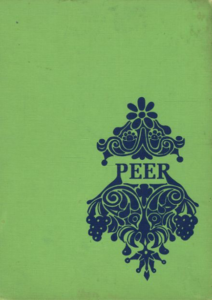
I was twenty-two years old that first year and too immature to be a good teacher, but I grew into that job. Somewhere along the line, I figured out that teaching was not about my television shows. It was about the students. I did better from there on.
I didn’t stay with it, though. Teacher’s pay started out low and ramped up very slowly. My wife was a teacher, too, but even on double pay we worried we couldn’t support a family. We talked it through and decided I’d apply to law school.
Shortly after I mailed out my applications, the principal called me to the auditorium over the P.A. system. I walked in to find my students assembled there. They ushered me to the front of the room and one of them read aloud their dedication of the yearbook to me. I’m a little blurry about what I said to them. All I remember is struggling to keep it together. I hope I conveyed how much it meant to me.
The following spring, I was accepted to law school, and with more than a little reluctance, I gave the county notice of my intent to resign at the end of the school year.
This decision worked out well for us, but I still have my doubts. I taught for three years. Over four hundred students sat in my classes. They’re in their sixties now, and I don’t know where they are or how they fared in life. Teaching them was the hardest job I ever had. I made a lot of mistakes, but I was getting the hang of it when I walked away. In rare moments, I broke through and made a difference. Those moments were each a great gift, and because of them, forty-five years later, I sometimes still dream about the road not taken.



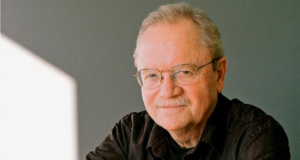
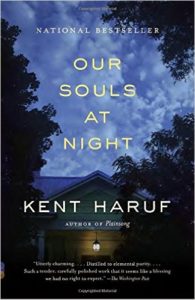
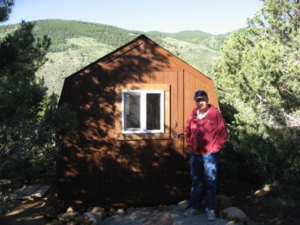 He started to write their love story on May 1, 2014. He retired each morning to the prefabricated shed behind his house where he always did his writing, only this time he was tethered to an oxygen tank. Throughout his career and in this case, he used what has to be the most unusual writing method ever employed. He put on a wool stocking cap, pulled it down over his eyes, and tapped out his first drafts blind on an old Royal upright typewriter. He did this to shut out the real world so he could dream his way into the landscape and community of Holt, Colorado, the fictional high-plains small town where his stories take place. After he completed a chapter typing blind, he took off the cap, reviewed the raw text with all its typos and mistakes, made notes of changes in the margins, and then typed a clean revision.
He started to write their love story on May 1, 2014. He retired each morning to the prefabricated shed behind his house where he always did his writing, only this time he was tethered to an oxygen tank. Throughout his career and in this case, he used what has to be the most unusual writing method ever employed. He put on a wool stocking cap, pulled it down over his eyes, and tapped out his first drafts blind on an old Royal upright typewriter. He did this to shut out the real world so he could dream his way into the landscape and community of Holt, Colorado, the fictional high-plains small town where his stories take place. After he completed a chapter typing blind, he took off the cap, reviewed the raw text with all its typos and mistakes, made notes of changes in the margins, and then typed a clean revision.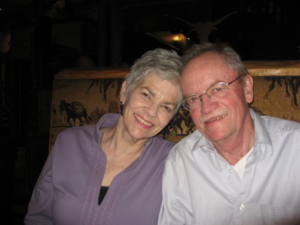
 Our Souls at Night
Our Souls at Night
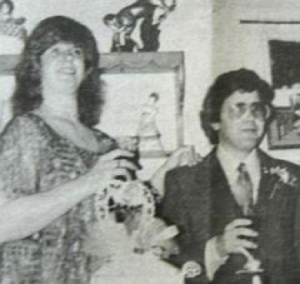 In 1994, nine years after Chichester left San Marino, my wife and I were driving down Lorraine Road on the way to our house when we came upon scores of police cars in front of the old Sohus house. A policeman stopped us. “What’s going on?” I asked. “Active crime scene. You’ll have to leave the area, sir.”
In 1994, nine years after Chichester left San Marino, my wife and I were driving down Lorraine Road on the way to our house when we came upon scores of police cars in front of the old Sohus house. A policeman stopped us. “What’s going on?” I asked. “Active crime scene. You’ll have to leave the area, sir.”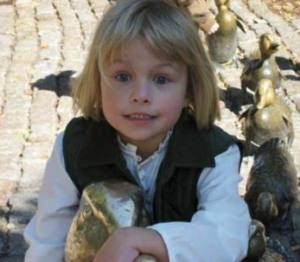
 Everything he said about himself in San Marino was a lie, and using that platform, he launched a three-decades-long career of stupendous frauds. He convinced titans of business and shrewd sophisticates that he was British royalty, a movie producer, a bond trader, a Rockefeller, and an expert in third world debt. And this only skims the surface. The biography,
Everything he said about himself in San Marino was a lie, and using that platform, he launched a three-decades-long career of stupendous frauds. He convinced titans of business and shrewd sophisticates that he was British royalty, a movie producer, a bond trader, a Rockefeller, and an expert in third world debt. And this only skims the surface. The biography,